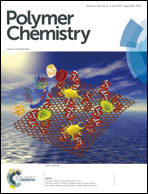Reversible deactivation radical polymerization in the presence of zero-valent metals: from components to precise polymerization
Abstract
Typically, reversible deactivation radical polymerization (RDRP) in the presence of a zero-valent metal involves a monomer, initiator, zero-valent metal, ligand and solvent. RDRP in the presence of a zero-valent metal demonstrates many advantages, including well-controlled behavior, low reaction temperatures, good retention of chain-end functionality, and the ready recyclability of the metal. The development of zero-valent metal-mediated RDRP has had a profound impact on precise polymer synthesis due to its preparative “green” characteristics, while still allowing excellent control over molecular weights and molecular weight distributions. Herein, we highlight recent work from the advent of zero-valent metal-mediated RDRP looking at advances in its components and the synthesis of well-defined polymers.


 Please wait while we load your content...
Please wait while we load your content...